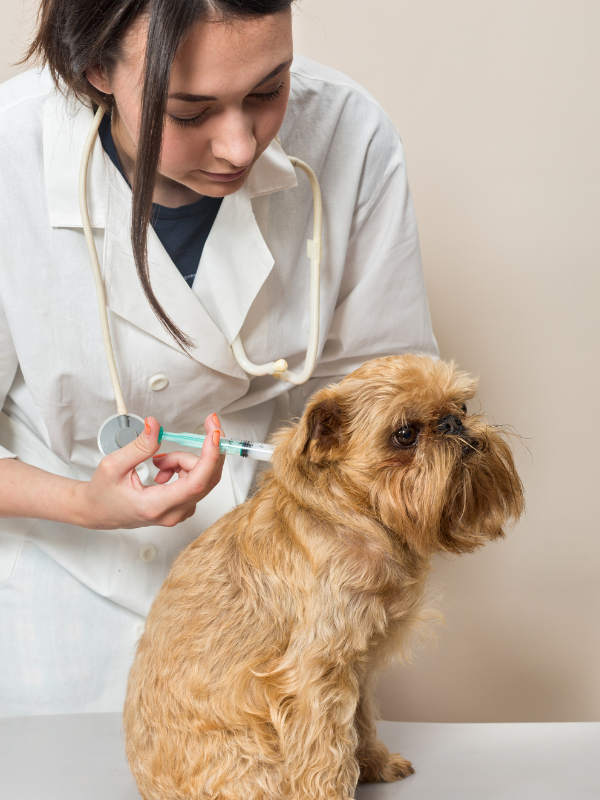737-215-3211

Essential Vaccinations for Your New Puppy: A Complete Guide
Bringing a new puppy into your home is an exciting and heartwarming experience. However, with all the joy and playfulness, it's essential to prioritize their health and well-being. One of the most crucial aspects of responsible puppy ownership is ensuring they receive the necessary vaccinations to protect them from preventable diseases. This comprehensive guide will walk you through the essential vaccinations your new puppy requires, the importance of each shot, and how to ensure they grow up to be healthy and strong companions.
Essential Vaccinations: A Vital Shield for Your Puppy
In this section, we will delve into the essential vaccinations your new puppy needs to stay safe and protected. Vaccinations play a critical role in preventing contagious and potentially life-threatening diseases. Remember, prevention is always better than cure!
1. Distemper
Distemper is a highly contagious viral disease that affects a puppy's respiratory, gastrointestinal, and nervous systems. The virus is spread through contact with an infected dog's bodily fluids. Puppies are particularly vulnerable to distemper, making this vaccination a top priority.
2. Parvovirus
Parvovirus is a severe and often deadly disease that causes vomiting, diarrhea, and dehydration in puppies. This virus can live in the environment for an extended period, making it highly transmissible. The parvovirus vaccination is a must to safeguard your pup from this devastating illness.
3. Canine Adenovirus (Hepatitis)
Canine adenovirus, specifically type-1, causes infectious canine hepatitis, which affects a puppy's liver. The vaccine protects against this viral infection and prevents serious liver damage.
4. Canine Parainfluenza
Canine parainfluenza is a respiratory disease that can lead to secondary infections. This vaccination is crucial to prevent respiratory issues and ensure your puppy's overall health.
5. Rabies
Rabies is a fatal viral disease that affects the nervous system of mammals, including dogs and humans. It is usually transmitted through the bite of an infected animal. In many regions, rabies vaccination is required by law, and it is vital for your puppy's safety and public health.
6. Leptospirosis
Leptospirosis is a bacterial infection that can affect both dogs and humans. It spreads through contaminated water or contact with infected animals. The leptospirosis vaccination is essential, especially if you live in areas with a higher risk of exposure.
7. Bordetella Bronchiseptica
Also known as kennel cough, Bordetella bronchiseptica causes inflammation of a puppy's respiratory tract. This vaccination is essential if your puppy is frequently around other dogs, such as in dog parks or boarding facilities.
8. Lyme Disease
Lyme disease is transmitted through ticks and can cause joint pain, fever, and fatigue in dogs. If you live in a tick-prone area, consider vaccinating your puppy against Lyme disease.
9. Canine Influenza
Canine influenza, or dog flu, is a contagious respiratory disease that can spread quickly among dogs. If your puppy interacts with other dogs regularly, this vaccination is worth considering.
10. Coronavirus
Canine coronavirus affects a puppy's gastrointestinal system, causing diarrhea and other digestive issues. While not as severe as other diseases, the vaccine can be beneficial in high-risk situations.
Vaccination Schedule: Paving the Path to Wellness
In this section, we'll outline the vaccination schedule for your new puppy. It's crucial to follow a precise timetable to ensure their immune system develops appropriately.
| Age (Weeks) | Vaccination | Description |
|---|---|---|
| 6-8 | Distemper | Provides immunity against distemper virus |
| 6-8 | Parvovirus | Protects against parvovirus, a deadly disease |
| 9-11 | Canine Hepatitis | Shields against canine adenovirus, protecting the liver |
| 9-11 | Parainfluenza | Provides defense against canine parainfluenza virus |
| 12-16 | Rabies | Essential for legal compliance and safeguarding your puppy |
| 12-16 | Leptospirosis | Protects against leptospirosis, a bacterial infection |
| 12-16 | Bordetella | Guards against Bordetella bronchiseptica, preventing kennel cough |
| 12-16 | Lyme Disease | Offers protection from Lyme disease transmitted through ticks |
| 12-16 | Canine Influenza | Provides immunity against canine influenza virus |
| 12-16 | Coronavirus | Vaccination for the canine coronavirus, a mild gastrointestinal infection (consider risk factors) |
Vaccination 101: What Every Puppy Parent Should Know
In this section, we'll cover the fundamentals of puppy vaccinations, helping you understand why they are essential and how they work.
What Are Vaccinations, and How Do They Work?
Vaccinations are medical preparations containing weakened or inactive forms of disease-causing agents. When administered, the immune system recognizes these agents as foreign invaders and mounts an immune response. This process primes the immune system to remember the pathogens, so if the puppy encounters the real virus or bacteria in the future, their body can quickly fight it off.
The Importance of Vaccinating Your Puppy
Vaccinations are crucial for your puppy's health and longevity. They protect them from potentially life-threatening diseases and reduce the spread of infectious agents within the dog population.
Herd Immunity: Protecting the Community
When a significant portion of the dog population is vaccinated, it creates what is known as "herd immunity." This phenomenon helps protect puppies who are too young to be vaccinated or dogs with compromised immune systems.
Side Effects of Vaccinations
Most puppies experience little to no side effects from vaccinations. However, some may exhibit mild symptoms, such as soreness at the injection site or slight lethargy. Serious adverse reactions are rare but possible. If you notice any concerning symptoms, consult your veterinarian immediately.
Vaccination Records: Keeping Track
Maintaining accurate vaccination records is essential. They serve as proof of your puppy's immunization history and may be required for travel, daycare, or boarding facilities.
FAQs About Essential Vaccinations for Your New Puppy
Q: When should I start vaccinating my new puppy?
A: Puppies should receive their first vaccinations at around 6-8 weeks of age. This initial round usually includes distemper and parvovirus vaccinations.
Q: Are there any risks associated with puppy vaccinations?
A: While most puppies tolerate vaccinations well, there is a slight risk of side effects. Serious reactions are rare, and the benefits of vaccination far outweigh the risks.
Q: How often should I get my puppy vaccinated?
A: Vaccination schedules vary, but most puppies need a series of shots every 3-4 weeks until they reach 16 weeks of age.
Q: Can I skip some vaccinations if my puppy stays indoors?
A: It's best not to skip vaccinations, even if your puppy primarily stays indoors. Indoor dogs can still be exposed to diseases, and vaccinations provide a vital layer of protection.
Q: Can my puppy socialize with other dogs before completing the vaccination series?
A: While socialization is essential, it's best to avoid interactions with unknown dogs until your puppy completes their vaccinations to minimize the risk of exposure.
Q: Are there any alternatives to traditional vaccinations?
A: Some pet owners may explore titer testing as an alternative to routine vaccinations. Titer tests measure a dog's existing immunity levels to determine if vaccinations are necessary.
Conclusion
Congratulations on becoming a responsible and caring puppy parent! By ensuring your new furry companion receives the essential vaccinations, you're giving them the best possible start in life. Vaccinations are a cornerstone of preventive care, protecting your puppy from numerous diseases and keeping them healthy for years to come.
Remember, your veterinarian is your most valuable resource when it comes to your puppy's health. Don't hesitate to consult them for personalized vaccination recommendations and any concerns you may have. With proper care, love, and vaccinations, your new puppy will grow up to be a happy, energetic, and cherished member of your family. Check out Puppy Fever Pro's dog supplements to be proactive about your dog's health.




Leave a comment